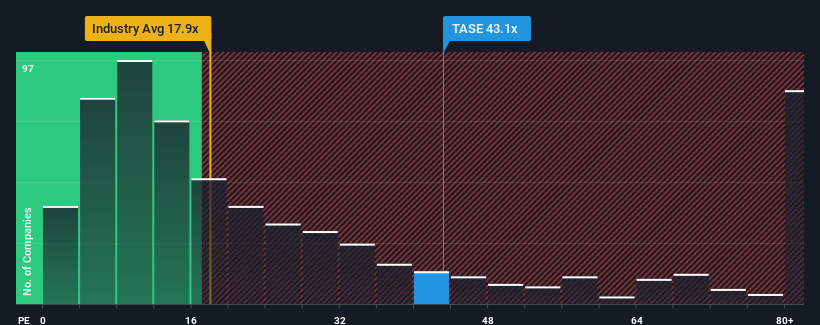- Israel
- /
- Capital Markets
- /
- TASE:TASE
The Tel-Aviv Stock Exchange Ltd. (TLV:TASE) Stock Rockets 25% As Investors Are Less Pessimistic Than Expected
The Tel-Aviv Stock Exchange Ltd. (TLV:TASE) shares have continued their recent momentum with a 25% gain in the last month alone. The last month tops off a massive increase of 112% in the last year.
Following the firm bounce in price, given close to half the companies in Israel have price-to-earnings ratios (or "P/E's") below 13x, you may consider Tel-Aviv Stock Exchange as a stock to avoid entirely with its 43.1x P/E ratio. Although, it's not wise to just take the P/E at face value as there may be an explanation why it's so lofty.
Tel-Aviv Stock Exchange certainly has been doing a great job lately as it's been growing earnings at a really rapid pace. The P/E is probably high because investors think this strong earnings growth will be enough to outperform the broader market in the near future. If not, then existing shareholders might be a little nervous about the viability of the share price.
See our latest analysis for Tel-Aviv Stock Exchange

How Is Tel-Aviv Stock Exchange's Growth Trending?
In order to justify its P/E ratio, Tel-Aviv Stock Exchange would need to produce outstanding growth well in excess of the market.
Retrospectively, the last year delivered an exceptional 34% gain to the company's bottom line. Pleasingly, EPS has also lifted 148% in aggregate from three years ago, thanks to the last 12 months of growth. Accordingly, shareholders would have probably welcomed those medium-term rates of earnings growth.
Comparing that to the market, which is predicted to deliver 33% growth in the next 12 months, the company's momentum is pretty similar based on recent medium-term annualised earnings results.
With this information, we find it interesting that Tel-Aviv Stock Exchange is trading at a high P/E compared to the market. It seems most investors are ignoring the fairly average recent growth rates and are willing to pay up for exposure to the stock. Although, additional gains will be difficult to achieve as a continuation of recent earnings trends would weigh down the share price eventually.
The Bottom Line On Tel-Aviv Stock Exchange's P/E
The strong share price surge has got Tel-Aviv Stock Exchange's P/E rushing to great heights as well. Using the price-to-earnings ratio alone to determine if you should sell your stock isn't sensible, however it can be a practical guide to the company's future prospects.
We've established that Tel-Aviv Stock Exchange currently trades on a higher than expected P/E since its recent three-year growth is only in line with the wider market forecast. Right now we are uncomfortable with the high P/E as this earnings performance isn't likely to support such positive sentiment for long. Unless the recent medium-term conditions improve, it's challenging to accept these prices as being reasonable.
Many other vital risk factors can be found on the company's balance sheet. Our free balance sheet analysis for Tel-Aviv Stock Exchange with six simple checks will allow you to discover any risks that could be an issue.
If P/E ratios interest you, you may wish to see this free collection of other companies with strong earnings growth and low P/E ratios.
Valuation is complex, but we're here to simplify it.
Discover if Tel-Aviv Stock Exchange might be undervalued or overvalued with our detailed analysis, featuring fair value estimates, potential risks, dividends, insider trades, and its financial condition.
Access Free AnalysisHave feedback on this article? Concerned about the content? Get in touch with us directly. Alternatively, email editorial-team (at) simplywallst.com.
This article by Simply Wall St is general in nature. We provide commentary based on historical data and analyst forecasts only using an unbiased methodology and our articles are not intended to be financial advice. It does not constitute a recommendation to buy or sell any stock, and does not take account of your objectives, or your financial situation. We aim to bring you long-term focused analysis driven by fundamental data. Note that our analysis may not factor in the latest price-sensitive company announcements or qualitative material. Simply Wall St has no position in any stocks mentioned.
About TASE:TASE
Outstanding track record with excellent balance sheet.
Similar Companies
Market Insights
Community Narratives


Recently Updated Narratives


MINISO's fair value is projected at 26.69 with an anticipated PE ratio shift of 20x


Fiverr International will transform the freelance industry with AI-powered growth

Constellation Energy Dividends and Growth
Popular Narratives


MicroVision will explode future revenue by 380.37% with a vision towards success


NVDA: Expanding AI Demand Will Drive Major Data Center Investments Through 2026



